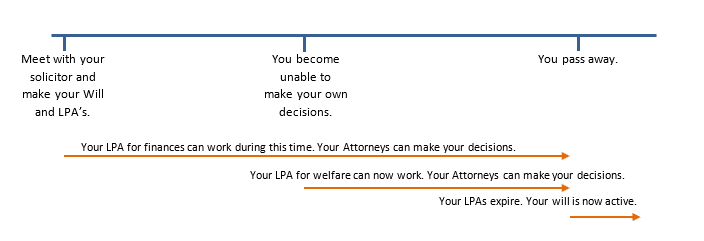Wills and Lasting Powers of Attorney: What’s the difference?

You may have heard the terms “Will” and “Lasting Power of Attorney (LPA)”, or “Executor” and “Attorney” be used interchangeably, but they are actually very different things. It is important to distinguish between them, as they are both significant documents that provide for your wishes at different stages of your life.
Do I need a Will or LPA?
Many people assume that these documents are not required until later in life and put off making them but the sooner they are made the better. Both documents are similar to insurance policies, we hope we never need them, but should we ever do, it is good to know they are in place. They provide you with the reassurance of knowing that your wishes will be granted as exactly as you want and helps family members and friends make appropriate arrangement when you are no longer able to. The circumstances in which these documents are required can be very difficult, so being prepared can reduce burden and make arrangements easier to sort, removing some element of stress from the situation.
What is a Will?
Wills are documents that you create whilst you are alive in anticipation of your death. Wills set out who you will leave your money and your belongings to people (or charities) on your death. In a Will, you also appoint an “executor”, or “executors”, who are the people that will deal with all of your assets and belongings when you die. It is their job to collect in money from the places that you may hold it, to pay any final bills you may have, such as gas, electricity and council tax, and give the remaining amount to the people that you specified within your will. Wills only apply when you have died.
What is a Lasting Powers of Attorney
Also known as LPAs, these are documents that you create whilst you are alive in anticipation that you may become too ill to manage by yourself. LPAs appoint a person, or people, known as your “attorneys” to act on your behalf in either your finances, your welfare, or both. They can make decisions for you whilst you are alive and can make any decision that you would usually be able to make. When you die, your LPA expires, and your Will takes its place.
When are the documents applicable?
Below is a timeline that demonstrates when the various documents are enforceable. They act as security for you and your loved ones when circumstances change and you no longer have the ability to make your own financial or welfare decisions.

Making a Will and Lasting Power of Attorney
If you would like to discuss the point raised within this article further with our team, please call a member of Lawson-West’s Wills and Probate team on 0116 212 1000 and arrange an appointment at any of our locations. We have offices in Market Harborough, Wigston and Leicester. The team has a wealth of knowledge and expertise in all of these areas and can provide you with the support and guidance that you require to help you make the suitable provisions.
View all

